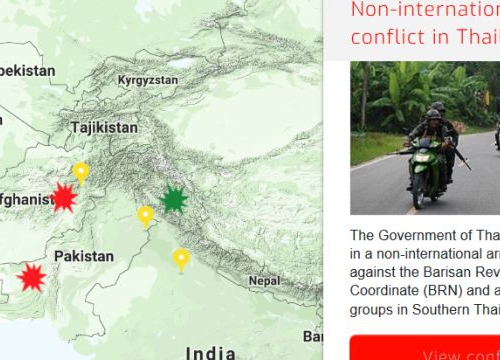Southern Thailand: A Non-International Armed Conflict between the Thai Military and Armed Groups Seeking Independence


Geneva Academy
29 November 2018
Our Rule of Law in Armed Conflicts (RULAC) online portal provides a detailed analysis and legal classification of the non-international armed conflict (NIAC) in Southern Thailand between, on the one hand, the Government of Thailand and, on the other, the Barisan Revolusi Nasional Coordinate (BRN) and associated groups.
The Barisan Revolusi Nasional Coordinate (BRN)
BRN was founded in 1963 as a response to the compulsory registration of Muslim boarding schools and the imposition of a secular curriculum by the Thai government.
‘BRN aims at liberating the southern Thai provinces inhabited by the ethnic – predominantly Muslim – Malay population and at establishing an independent Islamic state’ underlines Dr Chiara Redaelli, Research Fellow at the Geneva Academy.
Intensification of Armed Violence since 2004 and Classification as a NIAC
Tensions and armed violence between Thai armed forces and BRN have intensified since 2004 when the armed group started perpetrating a number of coordinated attacks.
‘The intensification of armed violence since 2004, along with BRN’s ability to plan, coordinate and carry out military operations, with fighting tactics involving bombings, drive-by and ambush shootings and machete attacks, prompted us to classify this situation as a NIAC’ explains Dr Chiara Redaelli.
‘We use two criteria to assess whether a situation of armed violence amounts to a NIAC under IHL: the level of armed violence must reach a certain degree of intensity that goes beyond internal disturbances and tensions, and at least one side to the conflict must be a non-state armed group that exhibits a certain level of organization’ adds Dr Chiara Redaelli.
While the intensity of violence diminished between 2007 and 2012, armed confrontations are again on the rise and increasingly common since 2012.
Peace Talks in Malaysia
In 2013 the Thai government and BRN initiated peace talks with the mediation of the Malaysian government. At first, the negotiations seemed promising, as the parties agreed to a ceasefire during the 40 days of Ramadan in 2013. However, the agreement did not prove successful and the BRN abandoned the peace talks in 2015.
Since then, it has been replaced in the negotiations by the MARA Patani, an umbrella that represents a number of opposition groups operating in the south. However, the parties have not been able to define the terms of a possible agreement.
About RULAC
The RULAC database is unique in the world in that it legally classifies situations of armed violence that amount to an armed conflict – international or non-international – under international humanitarian law (IHL).
‘This is crucial because IHL applies only in armed conflicts. Before humanitarian players, civil servants or academics can invoke IHL or analyze whether IHL was violated, they must know whether it applies. Outside armed conflicts, only international human rights law applies’ underlines Marco Sassòli, Director of the Geneva Academy.








